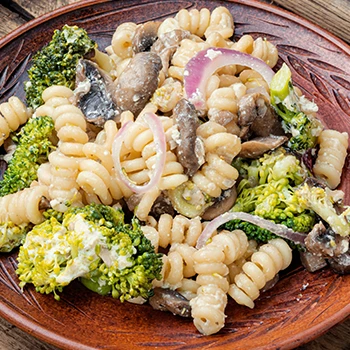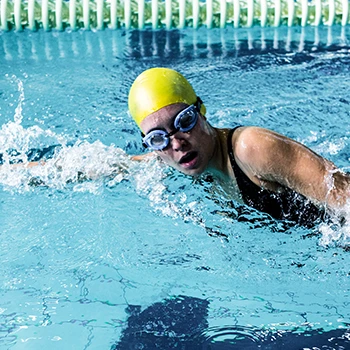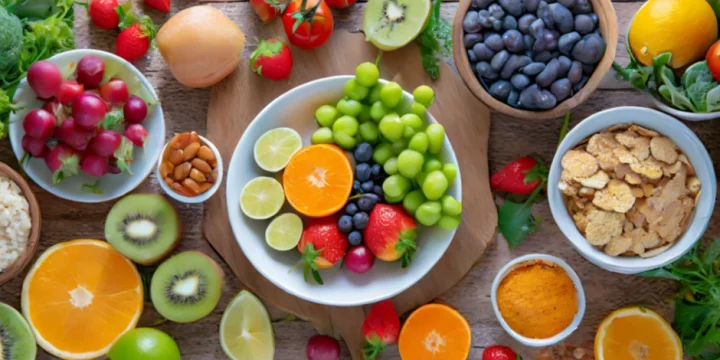Being in the fitness world for over ten years now, I've always incorporated swimming into my workouts because it is a great exercise to help me shed some pounds and get in shape.
But like any workout, it's important that you eat good pre-workout meals packed with energy and protein to get you through your training session.
I solicited expert nutrition advice from a dietician friend to find precisely what you should eat before swimming.
I connected all the dots, and here's a summary of what I found.
Quick Summary
- To enhance swimming performance, it's recommended to consume energy and protein-rich pre-workout meals like yogurt, fresh fruits, whole-grain cereals, and smoothies.
- Eating the right foods before swimming enhances focus, boosts energy levels, and improves overall swimming performance.
- According to the National Institute of Health, training on an empty stomach can lead to rapid fatigue due to depleted glycogen reserves.
- In my view, consuming a balanced pre-swim meal is crucial not only for sustaining energy but also for preventing discomfort like dizziness and lightheadedness during swimming sessions.
What to Eat and When?
My swimming sessions involve sprint and endurance training that can last up to 60 minutes.
This places unique considerations on what pre-workout meals I should take for training.
Diana Goodwin, a professional in the aquatics industry for over 14 years, believes that fueling the body with the right food before a pool session is important.
According to Goodwin, eating the wrong food could result in a drop in stamina as well as indigestion, cramps and nausea.
Before Morning Swim Workout

It's essential to eat something before your morning swimming session.
According to the National Institute of Health (NIH), because the body uses its glycogen reserves for intense exercise, training intermittent fasting or on an empty stomach may cause you to become fatigued rapidly [1].
I get up two hours before my swim so I have enough time to make these pre-workout hearty breakfast options that you can also try:
- Linseed and apple porridge
- American pancakes with hazelnuts in honey
- Peas with smoked salmon
- Banana yogurt
- Low-fat chocolate drink
If you wake up and jump straight to the pool, you can grab these light pre-workout snacks on your way.
- Fruit
- Fruit juice
- Fruit snacks
- A waffle with jam
If your stomach can't handle food that gets you energized before your workout session, consider increasing the carbohydrates you eat for dinner the night prior.
This will be deposited in the muscles in preparation for your morning swim.
Afternoon Swim Workout

You cannot eat lunch and then go swimming immediately; therefore, I recommend having a snack at least one to one and a half hours before exercising.
Try snacking on these:
- A single slice of toast with maple syrup
- Fresh fruits
- Yogurt or smoothie sports drinks
- Whole-grain cereal with banana chunks
According to NIH, you should pick fruits or whole grains so your body can turn them into glycogen and keep you energized during exercise [2].
If I combine a carbohydrate source with complete proteins or healthy fat sources, like oily fish, I keep it to a minimum because protein and fat require more time to absorb.
I always ensure to take sips of water or recovery drinks between my sets to stay hydrated.
Evening Swim Workout

If you swim at the end of the day after your workday, you'll probably have time to eat a full dinner an hour or so before the session.
Just be mindful of the serving size and nutrition facts of the meal you consume.
Keep your meals simple and focused on carbohydrates with a modest amount of wholesome fats and lean proteins.
I prefer to eat foods with enough energy levels, like a bowl of creamy veggie pasta, but avoid intense seasoning that can cause stomach upset.
If I want a protein-packed meal, I always go for something like lean chicken breast, brown rice, and avocado slices for healthy fats.
3 Benefits of Eating Before Swimming

Eating the right food before swimming sessions is critical. Here’s why.
1. Boost Your Energy Levels
According to NIH, carbs are your main energy source for exercise, stored as glycogen in muscles and liver [3].
Since our bodies store limited carbs, it's vital to regularly eat carb-rich meals.
Eat before exercising to keep energy levels up. Digesting while swimming, especially during intense winter training, can be tough.
Before swimming, focus on small, high-GI carbs for quick digestion and fast energy boost.
These include:
- A bottle of sports drink
- Sweet potatoes
- One big banana
- Large cereal bar or energy bar
2. Better Focus

Food and eating play a big role in your focus and performance during morning training.
Not eating enough can make concentrating hard.
According to Mayo Clinic, eating too little can lead to distracting hunger or even dizziness from low blood sugar [4].
On the flip side, overeating can make you swim with a heavy stomach, causing fatigue.
3. Improved Swimming Performance
When you swim or workout on an empty stomach, there might not be a lot of glycogen available for muscles to utilize to perform at their best.
This forces your body to look for alternative energy sources, like fat, which isn't the best option because you'll also lose vital muscle mass.
The nutrients in your glycogen and carbohydrate stores will allow you to exercise at a higher intensity and more endurance when you swim after topping off your fuel reserves by eating a light snack.
What to Avoid Eating Before Swimming?

You should avoid any food and drinks known to upset your stomach, including foods high in excess fiber, fat, caffeine, spices, and alcohol before swimming.
These foods can limit your exercise abilities because they can increase the risk of sickness, diarrhea, and upset stomach.
"Swimming's horizontal body position can cause stomach reflux, making you feel nauseated and affecting your performance. Therefore, eating a big heavy meal just before swimming is not recommended."
- Charlton Norton, Medical Doctor
Cut down on fatty foods before swimming to avoid indigestion, as they digest slowly. Steer clear of unfamiliar foods to dodge unexpected side effects. Skip high-sugar items and fizzy drinks that spike blood sugar levels.
Role of Supplements in Pre-Swim Nutrition
Consuming supplements like BCAAs (Branched-Chain Amino Acids), caffeine, or electrolytes before swimming can enhance performance.
- BCAAs aid in muscle preservation and reduce fatigue during prolonged swims.
- Caffeine boosts alertness and endurance by stimulating the central nervous system.
- Electrolytes, crucial for fluid balance, prevent dehydration and maintain muscle function.
However, individual responses vary, and excessive caffeine intake may lead to side effects. It's essential to stay hydrated and consider personal tolerance levels.
FAQs
Why Should You Eat or Drink Before Swimming?
You should eat or drink before and after swimming to get the energy to help you through the intense swimming strokes.
What Happens If You Swim on an Empty Stomach?
If you swim on an empty stomach, you can feel dizzy and lightheaded because you'll experience low blood glucose levels.
Can I Eat a Banana Before Swimming?
Yes, you can eat a banana before swimming. Bananas are a good source of energy to help you when working out.
What Is Best to Eat After a Swim?
Protein-packed instant recovery foods are the best to eat after a swim because they provide the necessary nutrients to heal and repair torn muscle tissues.
References:
- https://pubmed.ncbi.nlm.nih.gov/20519256/
- https://www.ncbi.nlm.nih.gov/pmc/articles/PMC4687103/
- https://www.ncbi.nlm.nih.gov/pmc/articles/PMC3248697/
- https://www.mayoclinic.org/diseases-conditions/hypoglycemia/symptoms-causes/syc-20373685
About The Author
You May Also Like






